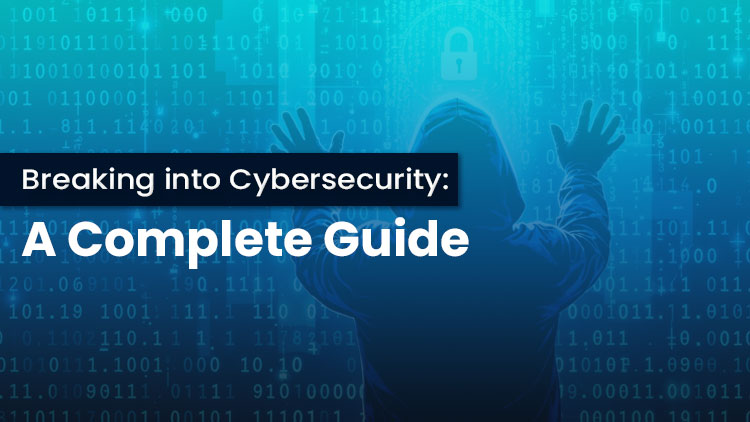
Breaking into Cybersecurity: A Complete Guide

Introduction
In today’s digital-first world, cybersecurity has become one of the most vital and fast-growing professions. As technology evolves, so do the threats against it — from hacking and data breaches to ransomware attacks and identity theft. The importance of safeguarding digital resources has never been higher. Businesses, governments, and individuals increasingly depend on cybersecurity experts to protect their sensitive data and maintain the integrity of their digital systems.
A career in cybersecurity offers more than just job security; it’s a path to high-paying opportunities, constant learning, and the chance to make a real impact. Whether you’re a tech enthusiast, a career changer, or someone eager to work on the frontlines of digital defense, cybersecurity could be the perfect fit. This guide will walk you through everything you need to know to break into this exciting field, including essential skills, career paths, and practical steps to launch your cybersecurity journey.
Take Your First Step into Cybersecurity
Cybersecurity might seem complex and intimidating at first, but with the right resources, mentorship, and tools, you can build a thriving career in this field. Whether you’re starting from scratch or transitioning from another industry, the key is to approach cybersecurity with curiosity and dedication.
Why Choose a Career in Cybersecurity?
Cybersecurity offers numerous advantages that make it an attractive career path. Let’s explore why so many professionals are drawn to this field:
- High Demand: Every industry — from finance and healthcare to e-commerce and government — requires cybersecurity experts to protect their digital infrastructure. The demand for skilled cybersecurity professionals continues to outpace supply, creating abundant job opportunities worldwide.
- Lucrative Salaries: Cybersecurity roles offer competitive compensation, even at entry-level positions. Experienced professionals often command six-figure salaries due to their specialized knowledge and high-value skill set.
- Varied Career Paths: Cybersecurity is a diverse field with multiple specializations. You can become an ethical hacker, security analyst, incident responder, cloud security expert, or even a chief information security officer (CISO).
- Job Stability: With cyber threats on the rise, organizations will always need cybersecurity professionals to defend against evolving attacks. This results in long-term job security and career stability.
- Continuous Learning: The cybersecurity landscape evolves rapidly, offering endless opportunities to learn new technologies and methodologies. You’ll always be at the forefront of innovation and digital defense.
Key Skills Required for Cybersecurity
Succeeding in cybersecurity requires a blend of technical expertise and essential soft skills. Let’s break down the key skills you’ll need:
Technical Skills:
- Networking & Security Protocols: A deep understanding of TCP/IP, DNS, VPNs, and firewalls is crucial for securing digital environments.
- Operating Systems: Familiarity with securing Windows, Linux, and macOS systems ensures you can protect diverse infrastructures.
- Programming & Scripting: Proficiency in languages like Python, Bash, or PowerShell helps automate tasks and identify vulnerabilities.
- Penetration Testing & Ethical Hacking: The ability to discover and fix security gaps through ethical hacking practices is a valuable asset.
- Incident Response & Risk Management: Detecting, mitigating, and managing cyber threats requires strategic thinking and swift action.
Soft Skills:
- Problem-Solving: Critical thinking is vital for addressing complex security issues and finding effective solutions.
- Attention to Detail: Identifying small vulnerabilities and subtle anomalies can prevent major security breaches.
- Communication Skills: Clearly conveying security threats and solutions to both technical and non-technical audiences is essential.
- Adaptability: The cybersecurity field evolves quickly — staying up-to-date with emerging threats and technologies is key.
Steps to Break into Cybersecurity
1. Learn Cybersecurity Fundamentals:
Before diving into advanced concepts, build a strong foundation in cybersecurity basics. Learn about network security, application security, ethical hacking, cryptography, and risk management. Free resources, online courses, and cybersecurity blogs are great starting points.
2. Acquire Hands-On Experience:
Building real-world skills is essential in cybersecurity. Here’s how to get hands-on experience:
- Create a Home Lab: Use tools like Kali Linux and Wireshark to practice hacking and network analysis.
- Contribute to Open-Source Projects: Help with security projects on GitHub to show your skills.
- Get an Internship: Apply for cybersecurity internships to learn from experts and gain real-world exposure.
3. Obtain Industry-Approved Certifications:
Certifications validate your skills and enhance your employability. Start with these:
- CompTIA Security+: Covers fundamental security concepts and is widely recognized by employers.
- Certified Ethical Hacker (CEH): Focuses on ethical hacking techniques and penetration testing.
- Cisco Certified CyberOps Associate: Teaches cybersecurity operations and incident response.
- GIAC Security Essentials (GSEC): Provides hands-on security training and practical knowledge.
4. Create a Solid Cybersecurity Resume and Portfolio:
- Highlight Certifications: Showcase your qualifications and relevant training.
- Document Projects: Maintain a GitHub repository of security projects and tools you’ve built.
- Write Cybersecurity Blogs: Share your insights and establish thought leadership in the field.
5. Look for Entry-Level Cybersecurity Positions:
Start with beginner-friendly roles that provide foundational experience:
- Security Analyst: Monitor and protect IT infrastructure from cyber threats.
- Penetration Tester: Identify and address vulnerabilities through ethical hacking.
- Incident Responder: Investigate and mitigate security incidents and breaches.
- SOC Analyst: Detect and respond to security events in real-time.
Common Challenges and How to Overcome Them
1. Lack of Experience:
Solution: Build experience through home labs, CTF challenges, and open-source contributions.
2. Overwhelming Learning Curve:
Solution: Start with the basics and gradually advance. Use structured courses and hands-on projects to build confidence.
3. Difficulty Landing the First Job:
Solution: Earn industry-recognized certifications, craft a compelling resume, and leverage LinkedIn networking for job opportunities.
4. Keeping Up with Rapid Technological Changes:
Solution: Subscribe to cybersecurity newsletters, join forums, and continuously learn through new courses and certifications.
Bonus Tips to Succeed in Cybersecurity
- Stay Curious: Cybersecurity is constantly evolving; always be willing to learn new techniques and technologies.
- Practice Ethical Hacking: Understanding how attackers operate can help you better defend against threats.
- Develop Strong Communication Skills: Being able to explain security risks to non-technical stakeholders is a valuable skill.
- Work on Real Projects: Setting up your own security lab or participating in open-source projects can enhance your experience and resume.
Conclusion
As cyber threats continue to evolve, the need for skilled cybersecurity professionals has never been greater. Breaking into this field requires dedication, continuous learning, and hands-on experience. By developing key technical skills, obtaining relevant certifications, and staying updated with industry trends, you can position yourself for a successful career in cybersecurity. With the right approach and persistence, you can become a valuable asset in securing the digital world.
VERSAtile Reads provides comprehensive learning resources to help you build a strong foundation and advance in cybersecurity. Explore our certification resources in terms of exam cram notes, practice questions, and cheat sheets to take the next step in your journey.
FAQs
1. Is a technical background necessary to start a career in cybersecurity?
Not necessarily. Many professionals transition from non-technical backgrounds. With the right training, certifications, and hands-on experience, anyone can enter this field.
2. What is the best certification for beginners in cybersecurity?
CompTIA Security+ is an ideal starting point, covering basic security principles and best practices recognized by employers.
3. How long does it take to enter cybersecurity?
Timelines vary, but with dedicated learning and practical application, you can land an entry-level position within 6 to 12 months.
- Published Date:



